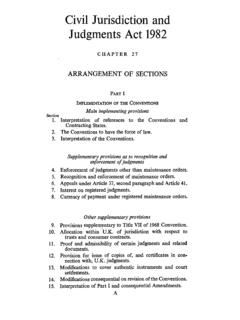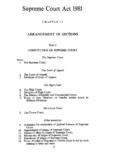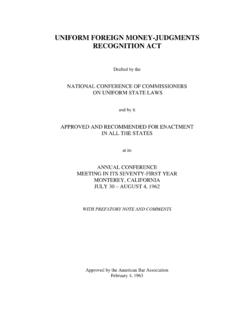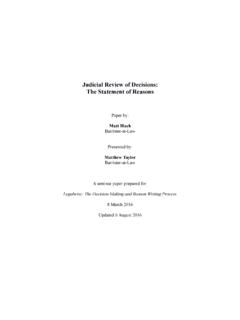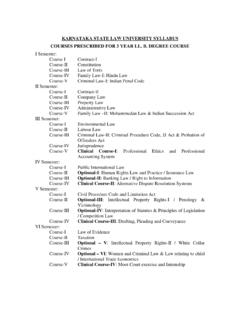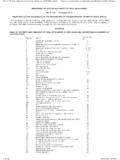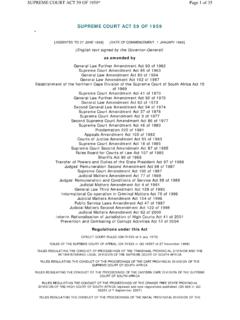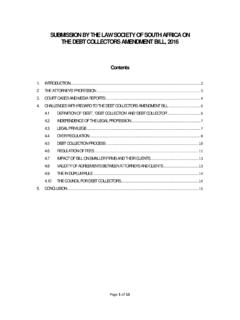Transcription of Chirwa v Transnet summary of judgment - SAFLII
1 CONSTITUTIONAL COURT OF SOUTH AFRICA Petronella Nellie Nelisiwe Chirwa v Transnet Limited and Others Case CCT 78/06 Medium Neutral Citation [2007] ZACC 23 Date of judgment : 28 November 2007 MEDIA summary The following media summary is provided to assist in reporting this case and is not binding on the Constitutional Court or any member of the Court. This matter deals with issues that had long divided courts and legal opinion concerning the jurisdiction of the Labour Court and the High Court to hear certain disputes involving employment and labour relations.
2 It arose from the dismissal of the applicant, Ms Chirwa , on 22 November 2002. At the time she was employed by Transnet Limited in the capacity of human resources executive manager of the Transnet Pension Fund Business Unit. The dismissal was preceded by an enquiry held by her supervisor, on the grounds of inadequate performance, incompetence and poor employee relations. Ms Chirwa first challenged her dismissal in the Commission for Conciliation, Mediation and Arbitration on the basis that it was procedurally unfair.
3 After conciliation failed, she did not pursue the labour relations mechanisms further, but rather approached the High Court on the basis that the dismissal violated her constitutional right to just administrative action, as given effect to by the Promotion of Administrative Justice Act (PAJA). The High Court applied the principles of natural justice and found that the dismissal of Ms Chirwa was unfair and granted the order for her reinstatement. Transnet appealed the order to the Supreme Court of Appeal.
4 The majority of the court upheld the appeal on the basis that the dismissal of Ms Chirwa did not fall to be reviewed under the provisions of PAJA. Ms Chirwa approached the Constitutional Court, seeking leave to appeal against the decision of the Supreme Court of Appeal. In this Court she relies on her right to procedurally fair administrative action. The claim is based on the proposition that since Transnet is an organ of state, the dismissal of its employee necessarily amounts to an exercise of public power, which is reviewable under sections 3 and 6 of PAJA.
5 In the alternative Ms Chirwa relies on section 195 of the Constitution, which sets out the 2principles that must guide public administration in the carrying out of its functions. These include accountability, professional ethics, fairness and objectivity. This case illustrates that a dismissal of a public sector employee has given rise to two causes of action, one under the labour law regime and the other under the administrative justice regime.
6 Therefore, an additional issue before this Court is whether the High Court has concurrent jurisdiction with the Labour Court in matters that arise out of an employment dispute, such as in the present case. Skweyiya J decided this matter on the basis of jurisdiction alone. He held that Ms Chirwa s claim is based on an allegation of an unfair dismissal for alleged poor work performance and should therefore have followed to the end the procedures and remedies under the Labour Relations Act (LRA), which specifically regulate this type of labour dispute.
7 He found that the High Court did not have concurrent jurisdiction with the Labour Court in this matter. First, Ms Chirwa had expressly relied on provisions of the LRA in formulating her claim in the lower courts as well as in this Court. Second, an applicant cannot be in a preferential position, having access to multiple forums, simply because of her or his status as a public sector employee. He concluded that if Ms Chirwa were to be allowed to depart from the finely-tuned dispute resolution mechanisms created by the LRA, a dual system of law would be perpetuated, one applicable in the civil courts and the other in the forums established by the LRA.
8 Therefore, to the extent that PAJA and the LRA overlap, Skweyiya J urges the legislature to revisit the applicable provisions. Skweyiya J found that it was unnecessary to decide the question whether the dismissal amounted to administrative action. If however, this determination needed to be made, he agreed with the conclusion reached by Ngcobo J that the dismissal of Ms Chirwa by Transnet does not amount to administrative action. Finally, Skweyiya J held that Ms Chirwa s reliance on section 195 of the Constitution was misplaced.
9 He found that although the section provides valuable interpretative assistance it does not found a right to bring an action. Ngcobo J concurred in the judgment of Skweyiya J, and considered two further issues. The first was whether the Labour Court had concurrent jurisdiction with the High Court in the dispute in question; and the second was whether the conduct of Transnet in dismissing Ms Chirwa constituted administrative action under the Constitution.
10 He noted that prior to the enactment of the LRA there were different statutes governing labour and employment relations. These multiple pieces of legislation created inconsistency and unnecessary duplication of resources as well as jurisdictional problems. He held that one of the primary objects of the LRA is to create a comprehensive framework of law governing the collective relations between employers and trade unions in all sectors of the economy.










